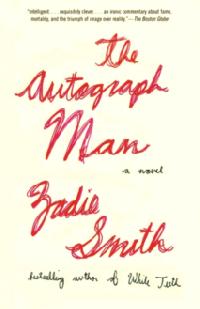| |
Name
of the Prose
Anonymity
is the theme tune of Zadie Smith's occasionally brilliant
second novel.
The Autograph Man
Zadie Smith
Hamish
Hamilton, £16.99, pp432

The
Booker Prize is hardly a lottery, but the books that go
through at each stage tend to be the ones with fewest enemies,
not the ones with most friends. Literary politics play a
part, even (or especially) when the committee tries to avoid
literary politics. It won't be easy for the judges of a
rather less celebrated prize to resist Zadie Smith's claims
to the Encore, awarded for the best second novel, most conclusive
consolidation of a talent.
The
hero of The Autograph Man does exactly what it says in the
title: Alex-Li Tandem collects and sells (without particular
success) the self-identifying marks made on paper or photograph
by people whose names are known. Autograph collecting has
its own economy, according to which a Howard Hughes is worth
a Bill Gates hundreds of times over, but it also represents
in diluted, distorted form a search for the sacred. The
hunger is for a symbol that will have absolute value, beyond
the reach of market forces. The holy of holies, as far as
Alex-Li is concerned, would be the autograph of Hollywood
actress long retired, famously reclusive. He has been writing
to her regularly since he was a boy -- nothing crudely soliciting,
just little prose poems imagining her mental life. For all
the response he has had, though, he might just as well have
written, on a regular basis, YOU DON'T KNOW ME, PLEASE MAKE
ME RICH.
Most
of the book is set in London, specifically an outlying northerly
suburb called Mountjoy, but Zadie Smith makes her mark on
landscape by removing the names that are already there.
So when Alex ventures into the centre, he goes 'down a famous
road to a monument' or to 'a popular square, framed on every
side by giant cinemas'. Thematically, this is pointed (the
relationship between things and the names for them being
a troubled one), but it also frees Smith up stylistically,
allowing her prose to explore textures without the neurosis
of constant reference.
Famous
people, on the other hand, are identified in a way that
renders celebrity flat: 'the popular singer Madonna Ciccone'
tagged equally with 'the popular musician Leonard Cohen'.
Paradoxically, though, there's a sense that above a certain
level of importance naming becomes impious rather than reverent.
Smith name-checks Nabokov indirectly at one point, through
his Russian pseudonym Sirin, and seems to rate Larkin even
more highly, to judge by her active withholding of his name,
using instead a brief quotation about the toad called work
and the designation 'Alex's favourite (and only) poet'.
A more
pervasively present absence is Martin Amis, whose hectoringly
insightful mannerisms Zadie Smith doesn't always manage
to make her own. Withholding a name is part of the novel's
strategy in some areas that seem arbitrary and sometimes
awkward. Alex turns on not a Mac, laptop or PC, but simply
a 'box of tricks'. Instead of the commonest conversational
expletive Smith supplies 'ug' and 'ugging', a substitution
which seems less coy in the Prologue, when her characters
are barely teenagers, than in the body of the book. Running
parallel with an extraordinary writerly assurance is a worry
about relying on second-hand formulations. This too can
be claimed as thematically appropriate (the colonisation
of life by representations of itself), but the anxiety seems
out of proportion.
The
book is divided into two main sections, subtitled the 'Kabbalah'
and the 'Zen' of Alex-Li Tandem. It's Judaism, though, that
dominates the book, in all its forms, from the mystical
to the never-quite-profane (the Jewish joke, with its core
of teaching). Even the subsections of the prologue are separated
by that other four-letter word, the tetragrammaton, the
word that refuses to be a word, name for what may not be
named.
All
the major characters are Jewish, though their observance
ranges from the absolute to the resistant, the would-be
non-existent. Jewishness works beautifully in the novel
as a source of ideas and symbols. Jewishness is an outsiderdom
with a front-row centre seat. It's also a shrewd way for
a British novelist to excite an American market, without
needing to relinquish domestic subjects.
This
ignoble suspicion about the rage to cross over flares up
only occasionally (when tick-tack-toe has driven out the
native noughts and crosses), most sharply in the Prologue.
'Exclusive province of childhood: a time when genetic/cultural
inheritance feels like this weird but cool thing you just
got landed with, like an extra shoe. Hey, check this out,
Tom! I'm Eurasian! Whoa, I'm a Maori! Look, no hands!' These
thoughts are inserted into a scene set in the Royal Albert
Hall in the late mid-1980s, where Big Daddy is about to
wrestle Giant Haystacks, but they seem altogether American,
in ideology as well as language.
Kitty
Alexander works fine as a character, but not at all as an
icon. In that particular area The Autograph Man is beaten
hollow by The Passion of New Eve, Angela Carter's novel
about a mysterious film star, Tristessa, and the man who
tracks her down. She's got it, her prose has it too, but
she's not ready to take it on as her subject.
Reviewed
by Adams Mars-Jones, The Guardian |

